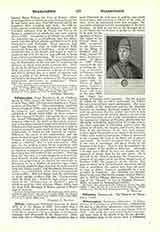

Villanovanus, ARNALDUS (ARNALDUS OF VILLANUEVA, or VILLENEUVE, or BACHUONE), celebrated in his day as a physician, pharmacist, and alchemist, b. between 1235 and 1240: d. at sea near Genoa, 1312 or 1313. Like much else connected with this very unusual man, most of the details of his life are obscure. The latinized form of his native town is Villanova; there were not a few towns of this name at that period in Spain, France, and Italy. Some identify it with Villanueva in Catalonia, Diocese of Valencia, others with Villeneuve-Loubet in the arrondissement of Grasse, France. He died while on his way to visit the sick pontiff, Clement V. Well versed in the classical languages, Hebrew, and Arabic, he also understood all that was then known of the natural sciences, especially medicine and pharmacology. At Barcelona he had John Casamila as teacher, thought highly of Galen, and among the Arabs cared only for Rhazes. He taught medicine, botany, and alchemy at Barcelona, Montpellier, and Paris. His life was a wandering one; besides the cities just mentioned, he lived for considerable periods of time at Lyons, Avignon, Rome, Florence, Bologna, Naples, and Palermo. He was considered superior to all other physicians and alchemists, so that he was frequently summoned by popes and princes. Thus he was at times at the papal Court during the reigns of Innocent V, Boniface VIII, Benedict XI, and Clement V. He was also the personal physician of Pedro III and James II of Aragon, Robert of Naples, and Frederick II of Sicily. He was repeatedly obliged to go from place to place because the Inquisition in Spain and Paris sentenced him to banishment on account of his fantastic writings, which were at times heretical. Owing to the large number of writings still extant bearing his name, some evidently spurious, others doubtful, it is not easy to judge Villanovanus. His reputation in alchemy was excelled only by that of Raymond Lully, who was regarded as his pupil. Modern criticism has assigned to an earlier age many chemical discoveries that were formerly ascribed to Villanovanus, as acids, alcohol, distillation etc. Yet a number of his works were very important in placing medicine and pharmacology on a scientific basis; besides an independent judgment they show ripe experience and great humanity. Although a layman he wrote much on theology. His alchemistic and astrological bent led him into erroneous opinions regarding the Church, the Mass, Antichrist, the end of the world, and the person of Christ. The first complete edition of his works was issued at Lyons in 1504, reissued at the same place in 1520 and 1532 (folio). The most complete edition is that of Taurellus (Basle, 1585), with a biography of Arnaldus. For the individual works see, in particular, Miser, op. cit. in bibliography below. Several of them were repeatedly reprinted before 1500.
JOSEPH ROMPEL

